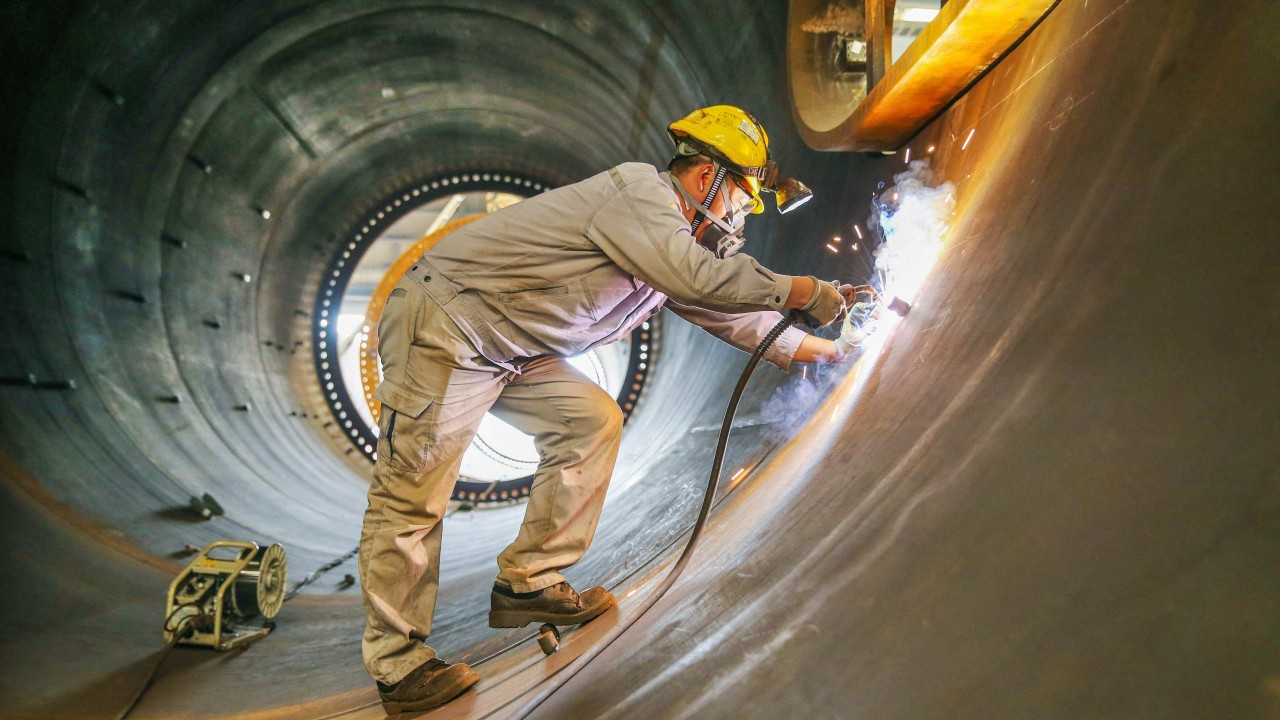China supply-chain expo: Apple, Amazon and other ‘enthusiastic’ industry giants to see how self-reliant China has become
[ad_1]

With China looking to send the message that it remains the go-to choice for manufacturing in a time of “de-risking”, several high-profile foreign firms are slated to participate in its inaugural supply-chain expo next week.
And the so-called world’s factory is also expected to use the event to showcase how self-sustained its manufacturing chain has become, particularly as many foreign firms have shifted some of their supply chains away from the country amid geopolitical uncertainties.
US tech giants Apple, Amazon, Intel, HP and Qualcomm, are among the named exhibitors at China’s International Supply Chain Expo that kicks off in Beijing next week. Among 515 participating companies, only about 130 are foreign, and American businesses account for one-fifth of the foreign participation.
Representatives from other American industry giants such as Tesla, ExxonMobil and FedEx are also expected to attend the expo, from November 28 to December 2, according to the organiser.
We hope that American companies can see fruitful results by being greatly involved in the expo
The expo comes as Beijing has been combating a push among Western countries to reduce reliance on the world’s largest manufacturer amid geopolitical wrangling, often with Washington.
Five industries will dominate participation in the expo: smart vehicles, agriculture, clean energy, digital technology and health.
Zhang Shaogang, vice-chairman of the event host, the China Council for the Promotion of International Trade (CCPIT), described the participation of American companies as “enthusiastic” and “way more than expected”, as he gave a preview of the expo to the media on Tuesday.
“We hope that American companies can see fruitful results by being greatly involved in the expo, and that they make great proactive progress toward a healthy, stable and long-term development for China-US relations while also developing their own business,” Zhang said.
US firms in China have worst outlook on record, AmCham Shanghai survey reveals
US firms in China have worst outlook on record, AmCham Shanghai survey reveals
Zhang added that there will also be a section featuring foreign and Chinese companies’ business cooperation, for example among American’s Qualcomm and China Mobile, Xiaomi and iQiyi.com.
Additionally, Zhang said that Chinese state-owned food processor COFCO and pharmaceutical giant CSPC will showcase their supply chains as leading examples for Chinese industrial giants. Chinese automobiles from a “fully self-sustained” manufacturing chain will also be highlighted.
Zhang said the expo aims to connect upstream, midstream and downstream enterprises in the industrial chain, and to contribute to “building a stable and smooth global supply chain”.
While tech companies have been at the forefront of a roiled supply chain in the past few years, due to increasing trade restrictions from the US in a wider tech competition with China, even smaller manufacturers of footwear, apparel and toy manufacturers are increasingly looking to countries in Southeast Asia to cut their reliance on China.
However, the expo organiser said belt and road participants still find working with Chinese companies attractive, especially those in the automobile, clean energy and agricultural sectors.
Warning for US, Thai farmers: China to grow 90 per cent of its grain by 2032
Warning for US, Thai farmers: China to grow 90 per cent of its grain by 2032
“These countries also recognise that it has been challenging for Chinese investment to move there because China’s manufacturing chain is more complete than theirs, and they lack the supporting framework that would allow Chinese companies to move there completely,” Lin Shunjie, the director general of CCPIT’s Chinese Governmental Department of Trade and Investment Promotion, said at Tuesday’s press briefing.
“Therefore, they are exploring the idea of attracting Chinese companies in building parts of the supply chain in their country, instead of aiming to move the entire Chinese supply chain out,” Lin said.
China has just reported a consecutive decline in exports for the sixth month, in October. Exports dropped by 6.4 per cent from a year earlier to US$274.8 billion, deeper than the fall of 6.2 per cent in September and much worse than the 3.8 per cent decrease expected by the market.
[ad_2]
Source link





